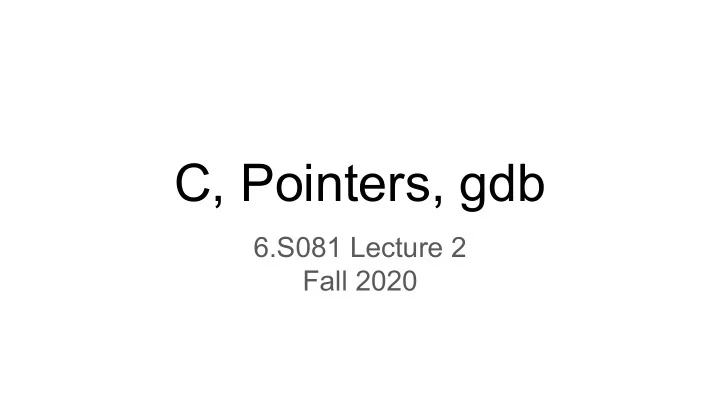

C, Pointers, gdb 6.S081 Lecture 2 Fall 2020
My First Memory Bug one = 1 abc = [‘a’, ‘b’, ‘c’] two = one abcdef = abc two += 1 abcdef += [‘d’, ‘e’, ‘f’] print(one) print(abc) print(two) print(abcdef) ----------------- ----------------- 1 [‘a’, ‘b’, ‘c’, ‘d’, ‘e’, ‘f’] 2 [‘a’, ‘b’, ‘c’, ‘d’, ‘e’, ‘f’]
Memory in C Static Memory ● Global variables, accessible throughout the whole program ● Defined with static keyword, as well as variables defined in global scope. Stack Memory ● Local variables within functions. Destroyed after function exits. Heap Memory ● You control creation and destruction of these variables: malloc(), free() ● Can lead to memory leaks, use-after-free issues.
Pointers in C A pointer is a 64-bit integer whose value is an address in memory. Every variable has an address, so every variable’s pointer can be accessed, including a pointer to a pointer. And a pointer to a pointer to a pointer. And so on. A pointers can handle arithmetic with the operators ++, --, +, -.
Pointer Syntax int x = 5; int *x_addr = &x; (same as int* x_addr = &x;) -> ex: 0x7ffd2766a948 *x_addr = 6; -> you can use the * operator to access the underlying value. int x_value = *x_addr; dereferencing -> this gives 6 int arr1[10]; -> Arrays are secretly pointers! More on that later. int *arr2[20]; -> Array of pointers, making arr2 a pointer to a pointer. void *myPtr; Try these out! Make a new user/ program like in Util.
Back to Memory char* makeABC() { char y[3] = {'a', 'b', 'c'}; return y; } What’s wrong with this?
Pointer Arithmetic, yay! Suppose we have some char *c with value 0x100002. c++; -> 0x100003 c += 4; -> 0x100007 Makes sense!
Pointer Arithmetic, sigh. Suppose we have some int *i with value 0x100002. i++; -> 0x100006 i += 4; -> 0x100016 Pointers add and subtract in increments of the base data’s length (in bytes).
Arrays in C C arrays are contiguous blocks of memory holding a particular data type. The variable is the pointer to the beginning of the array. char myString[40]; -> type of myString is char* char* myArrayOfStrings[20]; -> type of myArrayOfStrings is char** int counting[5] = {1, 2, 3, 4, 5}; -> type of counting is int*.
Arrays in C The bracket operator (i.e accessing arr[1]) is just syntactic sugar for pointer arithmetic. If we have int arr[4] = {5, 6, 7, 8}; these are equivalent: arr[2] = 50; *(arr + 2) = 50; -> Remember pointer arithmetic! 2[arr] = 50; -> Addition is commutative!
Arrays in C, Downsides We are allowed to access or modify illegal memory by accessing an array out of bounds. C provides no checking whatsoever. The behavior can be unexpected. Use your size variables whenever possible!
Bitwise Operators in C Everything is ultimately bits, C lets us manipulate those bits. The following numbers are all binary: & (and): 10001 & 10000 -> 10000 | (or): 10001 | 10000 -> 10001 ^ (xor): 10001 10000 -> 00001 ~ (complement): ~10000 -> 01111
Bitwise Operators in C << (left shift): 1 << 4 -> 10000 (binary) -> 16 (decimal) >> (right shfit): 10101 >> 3 -> 10 (binary)
Bitwise Operators in xv6 We can combine these operators to make flag setting easy: Define bit offsets flag0 = 0, flag1 =1, flag2 = 2. To set flag flag0 and flag2: flags = (1 << flag0) | (1 << flag2) -> 101 To check if a flag is set in a flags integer: if(flags & flag1) -> 101 & 010 == 0 (false!)
Casting in C To cast in C: (newType)variable void* to char*: (char*)myVoidPtr uint64 from expression: (uint64)(2 + 3), (uint64)myVoidPtr
Casting in xv6 See kalloc.c and vm.c for some good examples. extern char end[]; // first address after kernel. void kfree(void *pa) { struct run *r; if(((uint64)pa % PGSIZE) != 0 || (char*)pa < end || (uint64)pa >= PHYSTOP) panic("kfree"); ...
#include in C .h files contain declarations (specs) .c files contain definitions (implementations) Basically never #include a .c file! Include Guards help deal with nested/duplicate #includes (not used that much in xv6) Use the extern keyword! Extends function’s visibility to all files in the program.
Recommend
More recommend